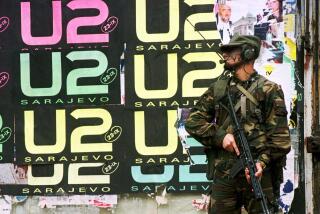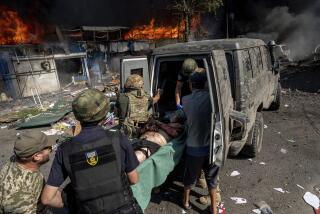‘A Dangerous New Phase’ for Bosnia : Balkans: There is a sense of imminent tragedy. Many see the embattled republic heading for division.
- Share via
ZAGREB, Croatia — The fax machine began whirring in Father Ivo Marcovic’s small office recently with a letter from his brother, who was trapped with the rest of the priest’s family in the hellish fighting that engulfed central Bosnia-Herzegovina for more than a week.
The Franciscan friar, a Croat who himself fled Sarajevo last year after Serbian soldiers held him prisoner for two days, read the news quietly.
“I don’t know if I will succeed in sending you this letter, but in the great pain and misfortune which has befallen us, I want to inform you of all that has taken place, so that you will be able to help us. . . ,” wrote his brother, Bozo Marcovic, a lawyer from the central Bosnian city of Zenica.
The Bosnian government’s Muslim army, he said, had surrounded all villages in the area beginning in mid-April. His brother and their father, Vlado, 71, a well-known farmer, had refused to leave Zenica when the trouble began and had stayed behind to negotiate a peaceful resolution to the growing tension between Croats and Muslims.
But then, the brother said, extremist Muslim forces--members of the 3rd Corps of the Bosnian army of Zenica--began arresting all Croats who passed through their checkpoints. Battles broke out the next day, and Croatian civilians began flooding out of the city. The men were rounded up and arrested; some of them were killed.
“The Zenica authorities are now taking the bodies and are driving them to the Zenica morgue,” the brother wrote. “For now we know definitely that the following have been killed: of the Marcovic family--our father Vlado, Anto, Kazimir, Stanko, Drago, Zoran, Rudo and Ilija; from the Vidosevic family--Dragun, Anto, Ilija, Niko and Jordan. Then Ivo Vuleta. . . .
“We have evidence that all the villages are deserted, most of the houses have been set alight, plundered and burned. . . . We are trying to bury the bodies that have been brought. . . . Dear brother, for now we wait to learn more of those caught up in the attacks of which I will try to inform you, if nothing else that you and Vjeko know and can inform all the others abroad. We the survivors, united in pain, sincerely greet you.”
The 43-year-old priest pushed the letter across a table with no expression. “So my father is now in the morgue . . . in Zenica,” he said finally. “They came and killed such people. These people were the soul of Bosnia. They believed in the common living of all the people of Bosnia, Serbs and Croats and Muslims, and they lose their life. If they kill such people, they kill Bosnia.”
His quiet resignation reflects a major change recently in the attitude toward the conflict in Bosnia. Many fear a division of the embattled republic unless there is substantial international intervention.
Though international mediators are pressing for a peaceful resolution and the United Nations is trying to protect at least six Muslim enclaves, these efforts are not enough to offset a new mood of despair here.
“Bosnia has just imploded, it’s clear,” a U.N. official said. “It could calm down again in the next few weeks and then ignite again. But we are definitely entering a dangerous new phase in the fighting.”
Bosnian officials believe the international community’s failure to take military action to end the war has prompted Serbs and Croats--and finally the Muslim-led government forces in response--to begin consolidating territories.
For Bosnians who had begun the war to protect Bosnia-Herzegovina as a place where all three ethnic groups could live jointly, there is a sense of imminent tragedy and lost opportunity.
Haris Silajdzic, Bosnia’s Muslim foreign minister, sat quietly in a Zagreb hotel room recently, his eyes sunken, his voice toneless. “The painful thing is that the international community seems not to be willing to stop it. . . . We never expected this,” he said.
“Imagine, 200,000 people died,” he said. “Now imagine 100 dogs rounded up in London, say, and killed. One hundred dogs. Or 100,000 penguins killed by people. What will happen? But 200,000 human beings, 2 million human beings uprooted, their lives destroyed completely, children maimed, 14,000 children dead under the age of 14 in Bosnia, rape camps, and it seems to be forgotten already.”
As he began talking, he reflected on Bosnia’s history as a kingdom from the days of the 9th Century and the evolution of its capital, Sarajevo, toward an urban civilization seemingly removed from the impulses of nationalism that darkened the Balkans for centuries.
“What were we to do except count on the international community to do its job? What else? Buy an A-bomb?” he asked.
“The problem of ex-Yugoslavia, I must admit it, is a problem of deep primitivism,” he added. “The vacuum left by the Communists was filled with ultranationalism, with masses of people disoriented, displaced physically and mentally. . . . They are disillusioned, they start looking for a familiar pattern or face, and they find a leader that speaks in very short sentences of the past as a future.
“The problem is that it’s partly a clash between culture and non-culture,” he said. “You can imagine what is in the hearts of people when they want to destroy Dubrovnik, Vukovar, Sarajevo, Mostar. That’s emptiness. That’s why they want to level everything down, whatever is culture, civilization. Level everything down.”
Silajdzic’s unframed question was clear: What does it mean for the rest of the world if Bosnia is lost? “I think we are looking at very bad times in Europe to come,” he replied. “This is the beginning. . . . When I said last year that we are stepping into a very dangerous period, everybody said, ‘That’s too far-fetched, everything is OK.’ I don’t think everything is OK. I think there is a big undercurrent of racism in Europe. I think we are repeating 1938.”
More to Read
Sign up for Essential California
The most important California stories and recommendations in your inbox every morning.
You may occasionally receive promotional content from the Los Angeles Times.













